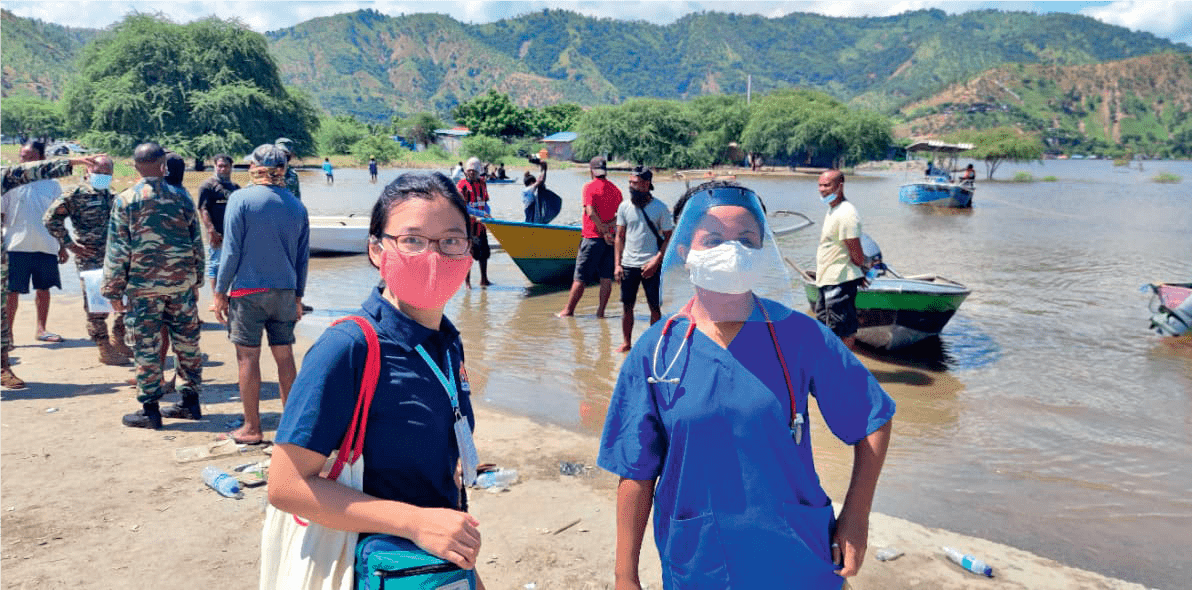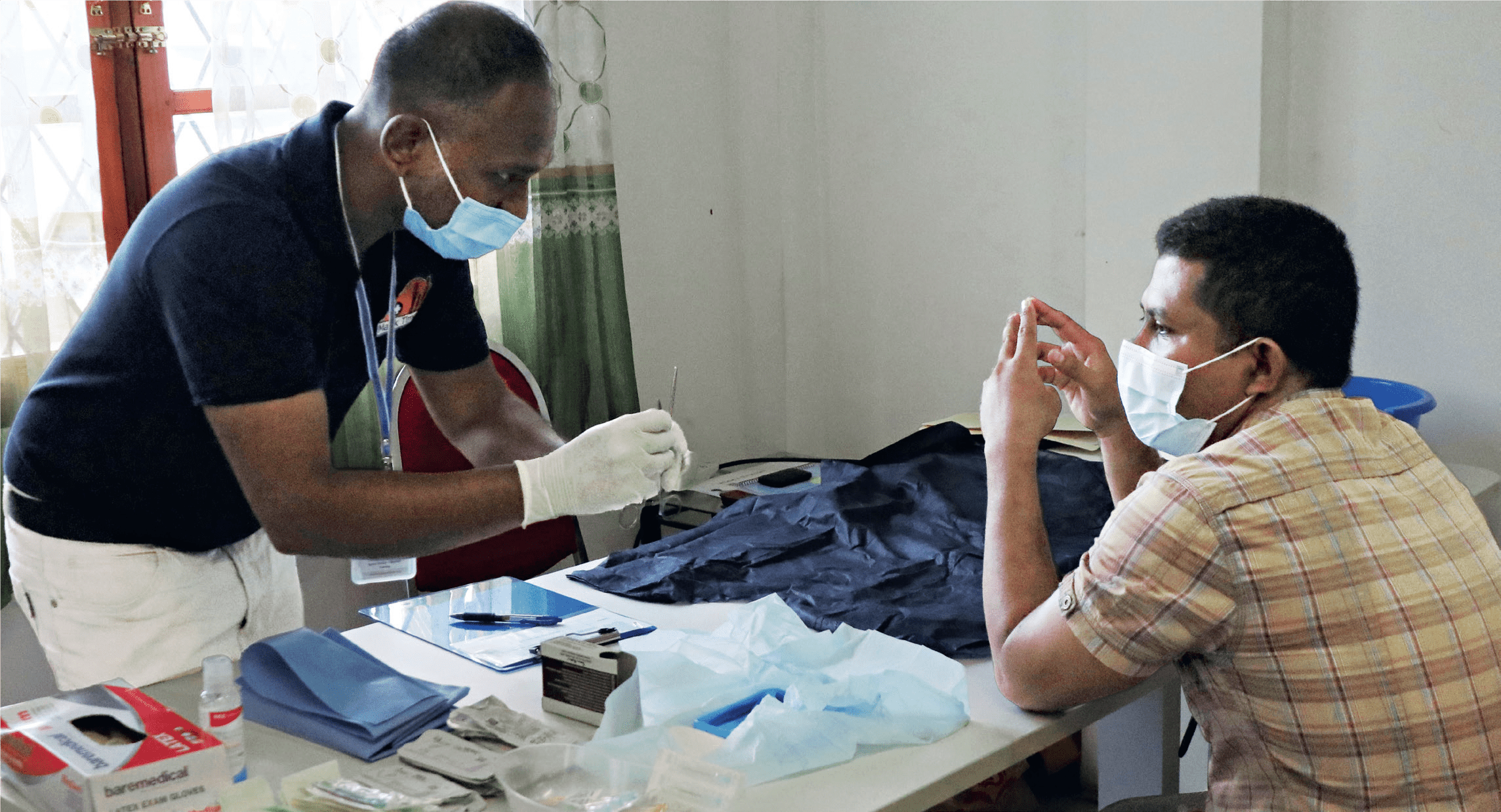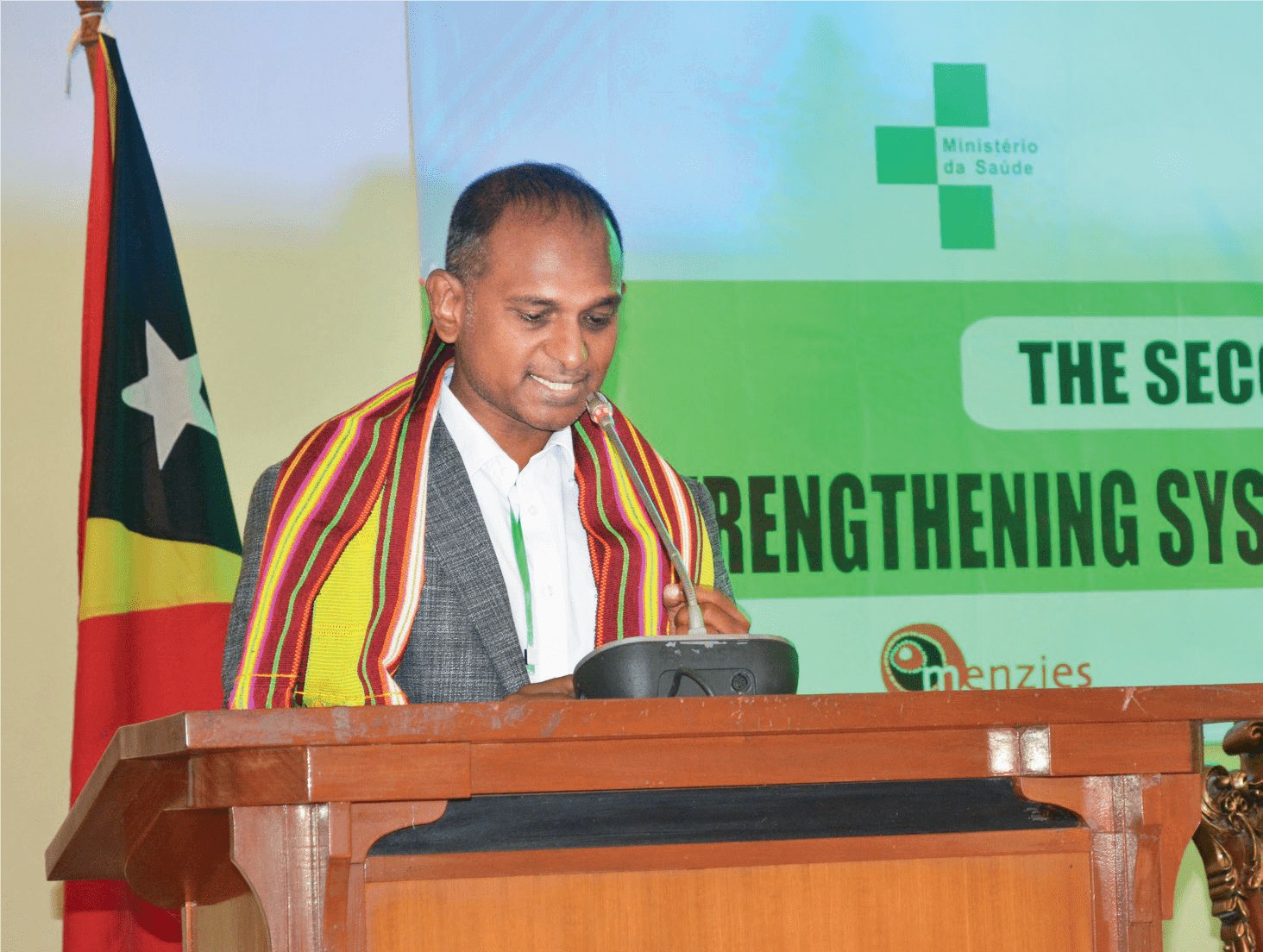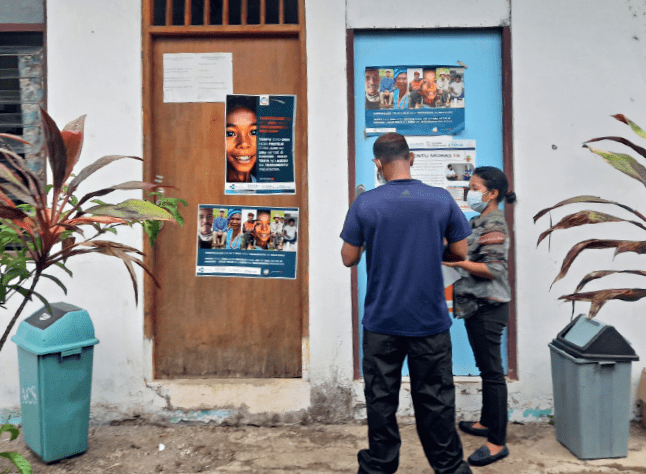Stories > Touching Lives, Driving Change
Touching Lives, Driving Change
A Singaporean physician couple works on the ground with local team members in Timor-Leste to raise healthcare standards in the island state.
BY GOH HWEE KOON
fter a two-week volunteering stint with a small clinic in Dili, the capital of Timor-Leste, in 2005, Dr Natarajan Rajaraman returned to give a much needed boost to the country’s healthcare system 15 years later.
Although the state of healthcare in the young nation has improved after decades of political instability, there is still much to be done. But this time, the public health physician is accompanied by his wife, Dr Lois Hong, a family physician.
Both had already been active healthcare volunteers in various countries over varying periods of time, including a year during which Dr Lois joined Dr Natarajan in Sierra Leone in 2017.

Dr Lois Hong (in pink mask) at a mobile clinic to help Dili residents physically affected by flash floods and landslides brought on by Cyclone Seroja in 2021.
The driving force behind their shared cause to contribute their skills and experience in underserved parts of the world is what Dr Lois describes as an “equity issue”. Due to their close connections with its healthcare community over the years, the couple came to know of non-governmental organisation (NGO) Maluk Timor’s work in strengthening the primary healthcare system and decided to make their big move there in 2020. They served in a full-time, in-country volunteer capacity before becoming full-time staff a year later.
The NGO, which is funded by private donors and government grants, mainly focuses on helping doctors, nurses and community health workers become the healthcare leaders of tomorrow in Timor Leste. Maluk Timor's Dili-based 82-strong team has only seven professionals from Indonesia, Singapore, India, Australia and Sri Lanka. Dr Natarajan is now its executive director, where he develops its strategy, oversees technical programming, and leads stakeholder engagement. He is also currently in charge of its rheumatic heart disease (RHD) – a critical form of acquired heart disease in children and adults worldwide – and oral health programmes.
Dr Lois, as the clinical director, gives oversight and drives the implementation of its tuberculosis (TB), human immunodeficiency virus (HIV), women’s health and social care, and health professionals’ development programmes. She also manages international volunteers and is responsible for work related to occupational health and safety, as well as staff learning and development.
Moving to Timor-Leste at the start of the Covid-19 pandemic was difficult for everyone around the world, but Dr Lois says in Timor-Leste, limitations in critical care were rather evident.

Dr Natarajan Rajaraman, executive director of non-profit Maluk Timor, is seen training a local family physician in Timor Leste.
“At the beginning of 2020, there was only one intensive care unit, consisting of four beds and two ventilators,” she says. “There were valid concerns about capacity for local oxygen production and delivery. Infrastructure and training to support infection prevention and control were lacking, triage systems were not well established, and limited basic supportive care was available for acute respiratory distress.”
Despite the risks and challenges, she and Dr Natarajan have no regrets about making the move to a foreign country that had uncertainties waiting for them, and puts things in perspective.
“We were fortunate to be without dependants and were able to move away for an indefinite time. There were certainly sacrifices made – mostly in terms of personal health risks, as obtaining health insurance was tricky during that period,” she says.
Three years on, they are still striving towards making meaningful changes to the local healthcare system, motivated by the growth of their young and passionate local team brimming with the potential to excel. “Watching the local staff blossom in confidence as they acquire workplace skills and develop their technical capacity — that is our greatest joy,” she says.

Dr Natarajan at the 2nd International Annual Health Scientific Conference 2022 in Timor Leste.
STRENGTHENING HEALTHCARE
Connecting with local healthcare
professionals and volunteers to help
raise the standards of medical facilities,
especially when resources are lacking
in the country, can be daunting, but the couple adopted a more pragmatic
approach to make inroads into the local
system: They joined grassroots initiatives
that were already doing relevant work.
“We believe in ground-up, locally led change as being the key to sustainability,” says Dr Lois. She shares the example of how a doctor who, after receiving training from the RHD team, organised ultrasound screenings and followed up on schoolchildren in his rural district. His initiative enabled many kids with early RHD to get access to lifesaving treatment before they got seriously ill.
One of Maluk Timor’s main goals is to focus on workforce development to ensure delivery of in-service education for doctors, nurses and other healthcare professionals in the government health sector, she says. She highlights the pandemic as a good case in point, as their team was able to rapidly roll out respiratory triage training across the country due to their familiarity with the learning needs of healthcare professionals in rural areas.
Another way is to keep up with the co-delivery of services, but with the end goal of handing them over to the health ministry, she says.
“As our RHD and HIV teams see patients within government-run clinics, we are able to do on-the-job training, coaching and supportive supervision while working with the same constraints and resources as the national health sector,” she explains.
An important point that Dr Lois makes is about simplifying decision-making processes through service-delivery design of communication materials and other tools that can help to implement best practices. For instance, healthcare workers can use a guide embedded within a digital form to better assess the medications that patients need to prevent TB, so they can focus more on counselling and building rapport with them during screenings.
She also emphasises the importance of working closely with rural communities via community health volunteers to spread awareness and, in some cases, understand potential barriers so that interventions are appropriate to each community.
COMPLEX CULTURAL LESSONS
Being in Timor-Leste has made the couple
re-examine their own cultural assumptions.
“The Singaporean emphasis on efficiency
and pragmatism may have served us well
in the past, but that can work against us
in a context where relationships are highly
important,” says Dr Lois.
She explains that what they perceive to be the right way of doing things may not be so to the Timorese due to cultural differences. “We have had to learn to be humble and consider that there are often good reasons why people don’t do things ‘the right way’,” she adds.
“Not only have Dr Natarajan and
Dr Lois demonstrated a deep
understanding of the local culture
and healthcare system, they speak
our Tetun language fluently so
we can connect with one another
comfortably.”
Belmerio Jeronimo, tuberculosis programme manager, Maluk Timor
With such innate understanding of local sensibilities, both doctors have immersed themselves in the local culture. Maluk Timor’s TB programme manager, Belmerio Jeronimo from Iliomar in Timor-Leste, attest to the couple’s dedication. “Not only have Dr Natarajan and Dr Lois demonstrated a deep understanding of the local culture and healthcare system, they speak our Tetun language fluently so we can connect with one another comfortably. They make everyone feel like family,” he says.
Dr Lubanji Maseka, an international volunteer from Zambia who did a year-long stint at Maluk Timor as a TB mentor, echoes Belmerio’s view on the couple’s openness and willingness to learn.
“They took the initiative to engage with people where they could and were not afraid to ask questions to gain more understanding. It made me realise that you really have to understand the healthcare system you are engaged with and the attitudes of the people [including the locals] you work with in order to carry out meaningful and impactful work,” she says.

Dr Natarajan on a site visit to a district clinic that focuses on diseases such as tuberculosis. He works with the local healthcare professionals to strengthen the healthcare system in Timor Leste.
TIES THAT BIND
Another international volunteer, Karl
Marquez, who worked as a nurse mentor
for a year, appreciates the fact that people
from different walks of life bring diverse perspectives to the table.
“The beauty about working with
other international professionals
lies in the camaraderie formed by
sharing practices that may be done
differently in our home countries,
and the shared experience of
working together in a new country.”
Karl Marquez, international volunteer, Maluk Timor
“The beauty about working with other international professionals lies in the camaraderie formed by sharing practices done differently in our home countries, and the shared experience of working together in a new country, all while collaborating with a shared vision for the betterment of the communities we serve,” he says.
When asked about the importance of a strong partnership between Singapore and Timor-Leste to help make more meaningful changes in the public healthcare system, Dr Natarajan and Dr Lois brought up the lesson that Covid-19 has taught them — how the health and well-being of our neighbours is inextricably linked to our own.
“As Timor-Leste prepares to join
Asean as a full member in the near
future, I see a shared future for our
two island nations with their own
rich histories.”
Dr Lois Hong, Singaporean healthcare professional, Maluk Timor
“As Timor-Leste prepares to join Asean as a full member in the near future, I see a shared future for our two island nations with their own rich histories. Much as Timor-Leste can learn from Singapore’s journey of infrastructure development, I think Singaporeans will be enriched by the mental resilience, strong sense of purpose and connectedness of the Timorese to their land and to each other,” says Dr Lois.
The impact of their work as changemakers in public health has not only made a positive difference to the lives of the Timorese, but also to themselves.
“It has definitely brought our problems down to size,” she says. “We have learnt to value relationships, the gift of good health, and easy access to potable water.”
